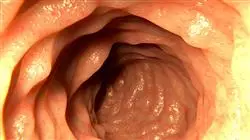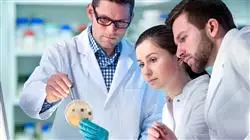University certificate
The world's largest faculty of medicine”
Introduction to the Program
Actualízate en las estrategias para prevenir la Disbiosis Intestinal en tus pacientes de manera 100% online”

La Microbiota Intestinal cumple una gran variedad de funciones cruciales para la Salud, como la digestión de alimentos, la producción de vitaminas, la regulación del sistema inmunológico y la protección contra patógenos. Y no es para menos, pues en el organismo existen hasta 39 billones de bacterias, las cuales forman un ecosistema único y diverso. De hecho, este varía en función de diversos factores, tales como la alimentación, el estilo de vida y el estado de Salud del individuo.
En este contexto surge la necesidad de contar con profesionales médicos altamente preparados en el manejo de la Microbiota Intestinal y la Disbiosis, en aras de que puedan dominar las complejas interacciones entre los microorganismos intestinales y el hospedador humano, así como los factores que influyen en su equilibrio. Por esta razón surge el presente programa, que tiene como objetivo actualizar a los médicos especialistas en esta área, dotándolos de los conocimientos necesarios para obtener una visión profunda de la Microbiota Intestinal. Así, se verán en disposición de identificar las alteraciones y su relación con diversos trastornos gastrointestinales y enfermedades sistémicas.
Lo mejor es que este Postgraduate certificate se imparte de modo 100% online. Sin duda, esto permite una valiosa flexibilidad para que los estudiantes organicen los recursos académicos de acuerdo con su tiempo y disponibilidad. Se ahorrarán, así, farragosos desplazamientos a centros de enseñanza presenciales y no deberán adaptarse a horarios predeterminados. Asimismo, se aplica la metodología pedagógica del Relearning, promovida por TECH a nivel internacional y consistente en la reiteración dirigida de los conceptos del temario mediante dinámicos recursos educativos. Algunos de ellos son resúmenes interactivos o casos prácticos.
También, este programa integra una exclusiva Masterclass que ahonda en las principales innovaciones y aplicaciones terapéuticas derivadas del estudio de la Microbiota Humana. A su vez, esta cuenta con la dirección de un reconocido y experimentado Director Invitado Internacional, gracias al afán que pone TECH en ofrecer a sus egresados la máxima excelencia académica.
Domina los avances terapéuticos más innovadores, derivados del estudio de la Microbiota Humana, gracias a la Masterclass que TECH te ofrece de la mano de un prestigioso experto internacional”
Este Postgraduate certificate en Microbiota and Intestinal Dysbiosis contiene el programa científico más completo y actualizado del mercado. Sus características más destacadas son:
- El desarrollo de casos prácticos presentados por expertos en Microbiota y Disbiosis Intestinal
- Los contenidos gráficos, esquemáticos y eminentemente prácticos con los que está concebido recogen una información científica y práctica sobre aquellas disciplinas indispensables para el ejercicio profesional
- Los ejercicios prácticos donde realizar el proceso de autoevaluación para mejorar el aprendizaje
- Su especial hincapié en metodologías innovadoras
- Las lecciones teóricas, preguntas al experto, foros de discusión de temas controvertidos y trabajos de reflexión individual
- La disponibilidad de acceso a los contenidos desde cualquier dispositivo fijo o portátil con conexión a internet
Analiza en detalle los marcadores de permeabilidad del síndrome del Intestino Permeable. ¿A qué esperas para matricularte?”
El programa incluye en su cuadro docente a profesionales del sector que vierten en esta capacitación la experiencia de su trabajo, además de reconocidos especialistas de sociedades de referencia y universidades de prestigio.
Su contenido multimedia, elaborado con la última tecnología educativa, permitirá al profesional un aprendizaje situado y contextual, es decir, un entorno simulado que proporcionará una capacitación inmersiva programada para entrenarse ante situaciones reales.
El diseño de este programa se centra en el Aprendizaje Basado en Problemas, mediante el cual el profesional deberá tratar de resolver las distintas situaciones de práctica profesional que se le planteen a lo largo del curso académico. Para ello, contará con la ayuda de un novedoso sistema de vídeo interactivo realizado por reconocidos expertos.
Sométete a útiles casos prácticos y realiza ejercicios autoevaluativos para que domines con solvencia el abordaje de infecciones intestinales de diversa índole"

Estás ante la oportunidad perfecta para profundizar en la composición de la Microbiota Intestinal en las diferentes etapas de la vida"
Syllabus
The structure of the contents has been designed by a team of professionals from the best educational centers, universities, and companies in the national territory, aware of the relevance of current specialization in order to intervene in the training and support of students, and committed to quality teaching through New Educational Technologies.

This Postgraduate certificate in Microbiota and Intestinal Dysbiosis contains the most complete and up-to-date scientific program on the market”
Module 1. Intestinal Microbiota II. Intestinal Dysbiosis
1.1. What is Intestinal Dysbiosis? Consequences
1.2. Intestinal Barrier. Physiology. Function. Intestinal Permeability and Hyperpermeability. Relation between Dysbiosis and Intestinal Permeability and Hyperpermeability
1.3. Relationship of Intestinal Dysbiosis and Other Types of Disorders: Immunological, Metabolic, Neurological and Gastric (Helicobacter Pylori)
1.4. Consequences of the Alteration of the Intestinal Ecosystem and its Relationship to Functional Digestive Disorders
1.4.1. Inflammatory Bowel Disease IBD
1.4.2. Chronic Inflammatory Bowel Diseases: Crohn's Disease. Ulcerative Colitis
1.4.3. Irritable Bowel Syndrome (IBS) and Diverticulitis
1.4.4. Intestinal Motility Disorders. Diarrhea. Diarrhea Caused by Clostridium Difficile. Constipation
1.4.5. Digestive Disorders and Nutrient Malabsorption Problems: Carbohydrates, Proteins, and Fats
1.4.6. Markers of Intestinal Inflammation: Calprotectin. Eosinophil Cationic Protein (ECP). Lysozyme
1.4.7. Leaky Gut Syndrome. Permeability Markers: Alpha-1 Antitrypsin. Zonulin. Tight Junctions and their Main Function
1.5. Alteration of the Intestinal Ecosystem and its Relationship with Intestinal Infections
1.5.1. Viral Intestinal Infections
1.5.2. Bacterial Intestinal Infections
1.5.3. Intestinal Infections due to Parasites
1.5.4. Fungal Intestinal Infections. Intestinal Candidiasis
1.6. Composition of the Intestinal Microbiota in the Different Stages of Life
1.6.1. Variation in Gut Microbiota Composition from the Neonatal-Early Childhood Stage to Adolescence. “Unstable Period”
1.6.2. Composition of the Intestinal Microbiota in Adulthood. “Stable Period”
1.6.3. Gut Microbiota Composition in the Elderly "Unstable Stage". Aging and Microbiota
1.7. Nutritional Modulation of Intestinal Dysbiosis and Hyperpermeability: Glutamine, Zinc, Vitamins, Probiotics, Prebiotics
1.8. Techniques for Quantitative Analysis of Microorganisms in Feces
1.9. Current Lines of Research

A unique, key, and decisive training experience to boost your professional development”
Postgraduate Certificate in Microbiota and Intestinal Dysbiosis
If you are interested in learning more about the Microbiota and Intestinal Dysbiosis, the Postgraduate Certificate in Microbiota and Intestinal Dysbiosis is ideal for you. During the Postgraduate Certificate, you will be able to update and clarify general and key terms for a full understanding of the subject such as Microbiome, Metagenomics, Microbiota, Symbiosis, Dysbiosis, among others. In addition, you will be able to study the microbial communities that coexist in symbiosis with humans, learning more about their structure, functions and how these communities can be altered due to factors such as diet, lifestyle, among others. Likewise, you will deepen your knowledge of the intestinal microbiota as the main axis of the human microbiota, its interrelation with the rest of the body, its study methods and its applications in clinical practice to maintain a good state of health. One of the important topics addressed in the Postgraduate Certificate is the relationship between intestinal pathologies, such as SIBO, Irritable Bowel Syndrome (IBS), Crohn's disease, and intestinal dysbiosis. You will also learn how to manage strategies, in an updated way, to treat the different intestinal infections by viruses, bacteria, parasites and fungi, modulating the altered intestinal microbiota.
You will be updated on the latest advances in intestinal microbiota and dysbiosis.
In this exclusive TECH program, you will delve into the bidirectional relationship between the Microbiota and the Neuroimmune System, studying in depth the gut-microbiota-brain axis and all the pathologies that are generated in its imbalance. In addition, you will delve into the entire oral and respiratory structure, and the ecosystems that live in them, seeing how an alteration of these ecosystems has a direct relationship with many associated pathologies. The best thing is that thanks to the study methodology implemented by TECH, you will be able to combine your current routine with this new academic challenge and achieve the goal in a few hours of study and 100% online.







